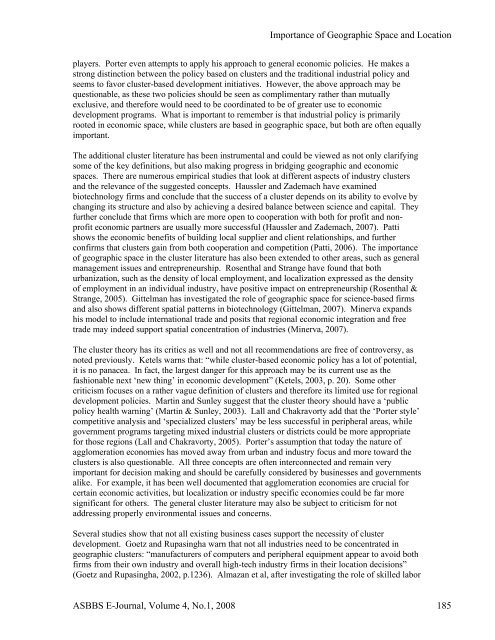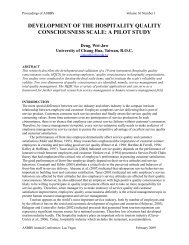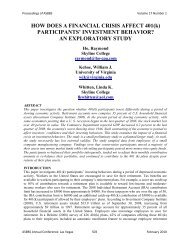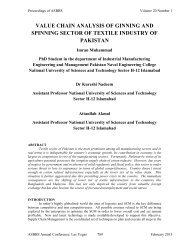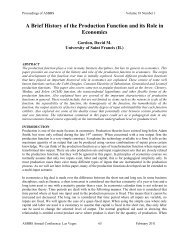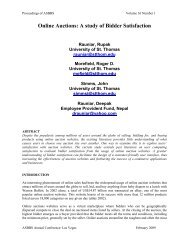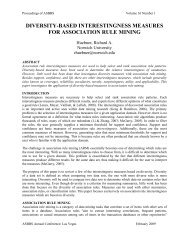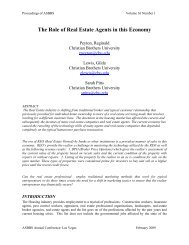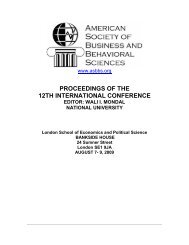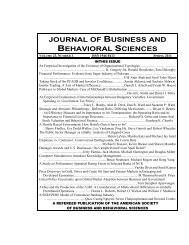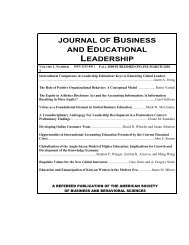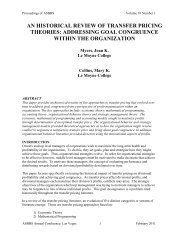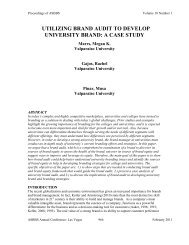stock repurchase announcements: a test of market ... - Asbbs.org
stock repurchase announcements: a test of market ... - Asbbs.org
stock repurchase announcements: a test of market ... - Asbbs.org
You also want an ePaper? Increase the reach of your titles
YUMPU automatically turns print PDFs into web optimized ePapers that Google loves.
Importance <strong>of</strong> Geographic Space and Location<br />
players. Porter even attempts to apply his approach to general economic policies. He makes a<br />
strong distinction between the policy based on clusters and the traditional industrial policy and<br />
seems to favor cluster-based development initiatives. However, the above approach may be<br />
questionable, as these two policies should be seen as complimentary rather than mutually<br />
exclusive, and therefore would need to be coordinated to be <strong>of</strong> greater use to economic<br />
development programs. What is important to remember is that industrial policy is primarily<br />
rooted in economic space, while clusters are based in geographic space, but both are <strong>of</strong>ten equally<br />
important.<br />
The additional cluster literature has been instrumental and could be viewed as not only clarifying<br />
some <strong>of</strong> the key definitions, but also making progress in bridging geographic and economic<br />
spaces. There are numerous empirical studies that look at different aspects <strong>of</strong> industry clusters<br />
and the relevance <strong>of</strong> the suggested concepts. Haussler and Zademach have examined<br />
biotechnology firms and conclude that the success <strong>of</strong> a cluster depends on its ability to evolve by<br />
changing its structure and also by achieving a desired balance between science and capital. They<br />
further conclude that firms which are more open to cooperation with both for pr<strong>of</strong>it and nonpr<strong>of</strong>it<br />
economic partners are usually more successful (Haussler and Zademach, 2007). Patti<br />
shows the economic benefits <strong>of</strong> building local supplier and client relationships, and further<br />
confirms that clusters gain from both cooperation and competition (Patti, 2006). The importance<br />
<strong>of</strong> geographic space in the cluster literature has also been extended to other areas, such as general<br />
management issues and entrepreneurship. Rosenthal and Strange have found that both<br />
urbanization, such as the density <strong>of</strong> local employment, and localization expressed as the density<br />
<strong>of</strong> employment in an individual industry, have positive impact on entrepreneurship (Rosenthal &<br />
Strange, 2005). Gittelman has investigated the role <strong>of</strong> geographic space for science-based firms<br />
and also shows different spatial patterns in biotechnology (Gittelman, 2007). Minerva expands<br />
his model to include international trade and posits that regional economic integration and free<br />
trade may indeed support spatial concentration <strong>of</strong> industries (Minerva, 2007).<br />
The cluster theory has its critics as well and not all recommendations are free <strong>of</strong> controversy, as<br />
noted previously. Ketels warns that: “while cluster-based economic policy has a lot <strong>of</strong> potential,<br />
it is no panacea. In fact, the largest danger for this approach may be its current use as the<br />
fashionable next ‘new thing’ in economic development” (Ketels, 2003, p. 20). Some other<br />
criticism focuses on a rather vague definition <strong>of</strong> clusters and therefore its limited use for regional<br />
development policies. Martin and Sunley suggest that the cluster theory should have a ‘public<br />
policy health warning’ (Martin & Sunley, 2003). Lall and Chakravorty add that the ‘Porter style’<br />
competitive analysis and ‘specialized clusters’ may be less successful in peripheral areas, while<br />
government programs targeting mixed industrial clusters or districts could be more appropriate<br />
for those regions (Lall and Chakravorty, 2005). Porter’s assumption that today the nature <strong>of</strong><br />
agglomeration economies has moved away from urban and industry focus and more toward the<br />
clusters is also questionable. All three concepts are <strong>of</strong>ten interconnected and remain very<br />
important for decision making and should be carefully considered by businesses and governments<br />
alike. For example, it has been well documented that agglomeration economies are crucial for<br />
certain economic activities, but localization or industry specific economies could be far more<br />
significant for others. The general cluster literature may also be subject to criticism for not<br />
addressing properly environmental issues and concerns.<br />
Several studies show that not all existing business cases support the necessity <strong>of</strong> cluster<br />
development. Goetz and Rupasingha warn that not all industries need to be concentrated in<br />
geographic clusters: “manufacturers <strong>of</strong> computers and peripheral equipment appear to avoid both<br />
firms from their own industry and overall high-tech industry firms in their location decisions”<br />
(Goetz and Rupasingha, 2002, p.1236). Almazan et al, after investigating the role <strong>of</strong> skilled labor<br />
ASBBS E-Journal, Volume 4, No.1, 2008 185


